Growing vegetables at home caught on during the most challenging phase of the pandemic in Hong Kong. Rebecca Lo tries to gauge if the amateur farming wave will sustain.
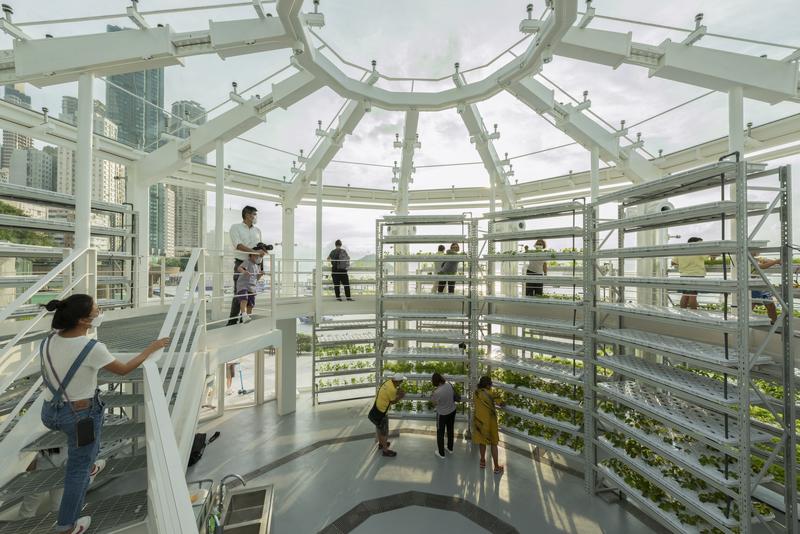 K-Farm in Kennedy Town supports hydroponic and aquaponic farming. Rough C Limited, the NGO running the facility, aims to inspire respect for all living things in community members participating in the process. (PHOTO PROVIDED TO CHINA DAILY)
K-Farm in Kennedy Town supports hydroponic and aquaponic farming. Rough C Limited, the NGO running the facility, aims to inspire respect for all living things in community members participating in the process. (PHOTO PROVIDED TO CHINA DAILY)
On a balmy summer evening recently, members of the American Institute of Architects’ Hong Kong Chapter, went on a tour of K-Farm. Led by the chapter’s past-president Vicky Chan and designed by his company Avoid Obvious Architects for the local NGO Rough C Limited, K-Farm aims to make farming fun by throwing innovative architecture into the mix.
K-Farm, with herbs and vegetables curated by Farmacy, runs parallel to the Belcher Bay Promenade. The compound consists of three open-air pavilions, a reflecting pond, a fish pond and planters anchored on either end by a greenhouse and administrative buildings. It introduces farming to the local community and operates on a three-year renewable tenancy.
Chan noted how circles were used as a design motif throughout structures where hydroponic and aquaponic farming was practiced. “The vertical green wall, vertical farming racks and farming tables allow people with special needs to access farming without bending down,” Chan explains. “All three shelters have rainwater collection and solar panels on their roofs, offsetting its electricity consumption.”
He hopes that K-Farm will inspire the next generation of farmers to incorporate “cool” architectural features in their facilities. “We hope our vision allows more people to understand how urban Hong Kong can be more inclusive toward all kinds of living things. This organic farm also helps the ecosystem of the whole area. As the adjacent parks use pesticides, our farm has suddenly become an attraction for birds and insects. K-Farm is increasing the biodiversity along the waterfront.”
 Landscape architecture expert and University of Hong Kong academic, Mathew Pryor says people take to rooftop farming because they enjoy the process more than the harvest. (PHOTO PROVIDED TO CHINA DAILY)
Landscape architecture expert and University of Hong Kong academic, Mathew Pryor says people take to rooftop farming because they enjoy the process more than the harvest. (PHOTO PROVIDED TO CHINA DAILY)
Community bonding
“Urban farms are a valuable contribution to the city,” states Mathew Pryor, the University of Hong Kong’s landscape architecture head. Pryor authored the book The Edible Roof and oversaw the HKU Rooftop Farm in Runme Shaw Building for seven years.
“My research after interviewing hundreds of participants indicated that rooftop farming is not about food — it is about happiness,” Pryor explains. “That is a difficult thing to put into a guideline. People, particularly those in the government, don’t know how to codify it.” However, such projects are successful when the public are personally invested in them, he adds.
Enoch To believes that trying out farming is what helped her survive the most challenging months of the pandemic in Hong Kong. Between working from home and supervising her eight-year-old son Allan’s Zoom lessons, To had managed to obtain one of the 20 allotments run by the Tung Chung residential complex in which she lives. For a HK$1,300 fee (US$167), she can farm a 3 by 0.8 meter plot, six months at a time.
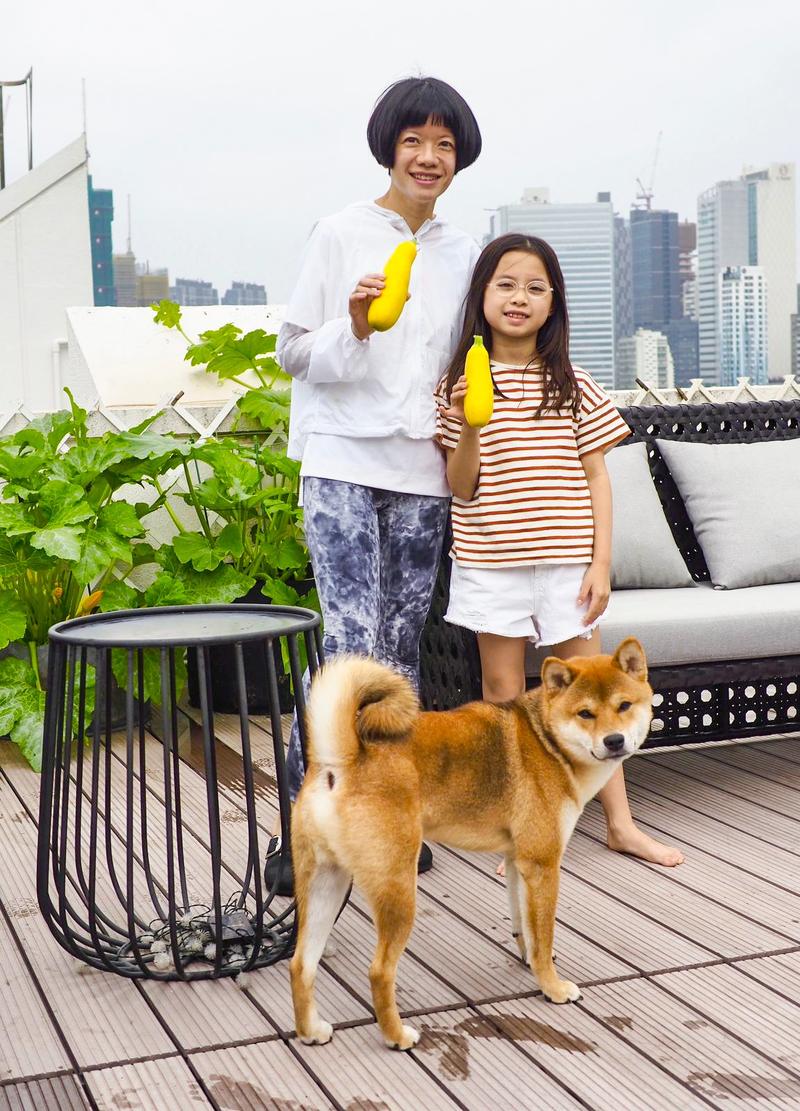 Urban farmers Caroline Ma with daughter Adelyn. (PHOTO PROVIDED TO CHINA DAILY)
Urban farmers Caroline Ma with daughter Adelyn. (PHOTO PROVIDED TO CHINA DAILY)
“We have been farming for a year,” To reveals. “Allan likes to help me catch worms. We can be there for an hour and don’t realize the time passing. We grow choi sum, papaya, beans, pea shoots and carrots, and use egg shells and tea bags as fertilizer. It’s all organic.”
Nowadays, To grows enough fruits and vegetables to meet her family’s needs, but says she is into farming primarily for the pleasure of it. “It’s therapeutic,” she says. Farming has led to greater community bonding, she adds, as neighbors often exchange seedlings. It’s also fun to watch what the person next door is up to, “such as our Indian neighbors tending the herbs they use in their cooking.”
Pryor agrees that successful urban farms strongly emphasize community building. The biggest challenge, he says, is for urban people to have a sustained interest in farming. As farming is an everyday activity, people who participate need to take ownership and responsibility. “Farms need constant gardeners,” he says. “We saw a lot of HKU students interested but when exam time arrives, they all disappear.”
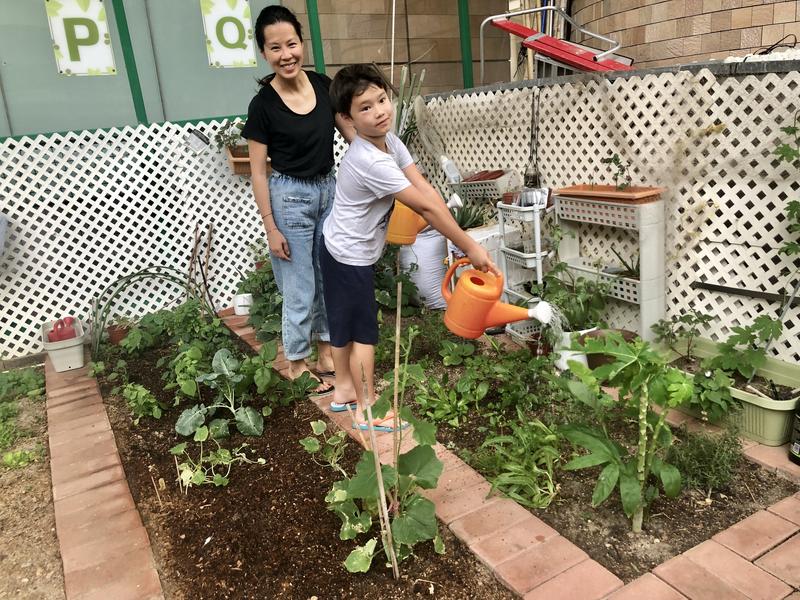 Enoch To with son Allan. (PHOTO PROVIDED TO CHINA DAILY)
Enoch To with son Allan. (PHOTO PROVIDED TO CHINA DAILY)
Start with something easy
Shouson Hill resident Caroline Ma started farming on her roof last year, finally realizing a childhood interest in gardening. “I was thinking more about sustainability,” she notes. “I have always wanted to make better use of our roof and encourage my daughter Adelyn to eat more vegetables.”
She began planting the seeds collected during various travels. “I started with mint and basil, and then challenged myself with zucchini and melon. Now I grow cantaloupes and daikon radish, which my mother-in-law used during Lunar New Year to make radish cakes.”
For Ma, farming is a meditative experience. “I am in my own little world and I can forget about the world’s problems for a brief period,” she says. Like To, she too has made friends over farming, exchanging seeds and harvests, and comparing notes with fellow urban farmers.
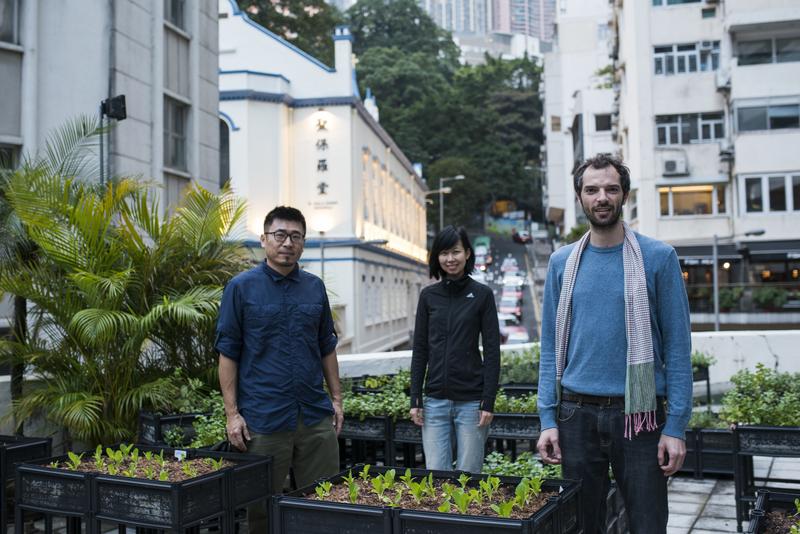 Rooftop Republic co-founders, Andrew Tsui, Michelle Hong and Pol Fàbrega. (PHOTO PROVIDED TO CHINA DAILY)
Rooftop Republic co-founders, Andrew Tsui, Michelle Hong and Pol Fàbrega. (PHOTO PROVIDED TO CHINA DAILY)
“Also, I am active in promoting urban farming and local non-genetically modified seeds,” Ma adds. “Many friends started their own rooftop or balcony farms after seeing my harvests on social media.”
Her roof is not the most ideal spot for growing things though, exposed as it is to unrelenting sun and wind. Still, Ma is grateful to have a bit of outdoor space.
“I highly encourage everyone to try growing something,” she states. “Roofs, balconies, terraces and gardens have their advantages and limitations. Start with something easy. Use organic and good quality soil, seeds and fertilizers. Find out what is seasonal to grow. Talk to other amateur urban farmers. Most like me are very eager to share. And if there is no space to grow at home, you can always rent a space in urban farms such as Vegefarmhk.”
“The government assumes that urban farms are commercial ventures and are not as willing to invest in them,” Pryor says. “Well-being or happiness cannot be monetized. Urban farming ticks all the right boxes: it promotes social well-being, and intergenerational interaction, among many other benefits…”
 The K-Farm compound runs parallel to Belcher Bay Promenade in Kennedy Town. (PHOTO PROVIDED TO CHINA DAILY)
The K-Farm compound runs parallel to Belcher Bay Promenade in Kennedy Town. (PHOTO PROVIDED TO CHINA DAILY)
Help at hand
Founded in 2015, Rooftop Republic has transformed nearly 80,000 square feet of underutilized Hong Kong spaces into 70 productive urban farms in premises ranging from schools to office buildings. It has worked with Link REIT at Lok Fu and Sun Hung Kai Properties at Metroplaza shopping mall in Kwai Fong.
“Our ultimate goal is to make urban farming available to everyone in the community,” states Pol Fàbrega, Rooftop Republic’s chief operating officer and co-founder. “From building customized farms on commercial or residential buildings to offering home gardening solutions, we support individuals and families to grow from the comfort of their own home.
“Urban farming could help companies increase their property value. Moreover, it could offer employees opportunities to participate in farming and practice sustainability,” says Fàbrega, who feels early exposure to farming through school initiatives could help “educate children about healthy food and lifestyle while improving self-esteem.”
“It cultivates greater understanding of environmental issues while offering students a learning experience outside of the classroom,” he adds.
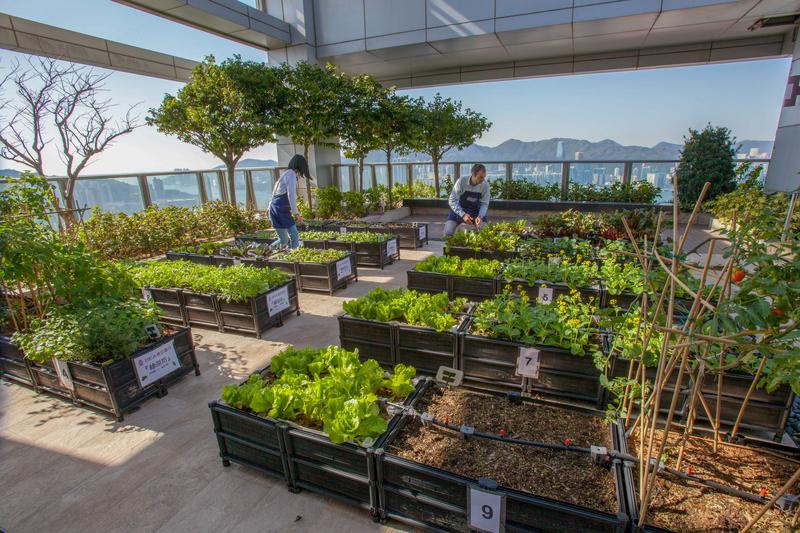 Rooftop Republic’s organic farm at Kwun Tong. (PHOTO PROVIDED TO CHINA DAILY)
Rooftop Republic’s organic farm at Kwun Tong. (PHOTO PROVIDED TO CHINA DAILY)
Rooftop Republic Academy provides hands-on training to nurture new farmers or those interested in setting up their own garden.
“Our team of experienced urban farmers oversees the entire operation at the farms,” notes Michelle Hong, Rooftop Republic’s chief marketing officer and co-founder. “We provide the necessary technical and human resources support for effective farm maintenance and fruitful experiences with our client’s stakeholders.”
Andrew Tsui, CEO and co-founder of Rooftop Republic, credits the explosion of interest in urban farms to more Hong Kong residents aspiring to a healthier and more sustainable lifestyle.
“As born and bred city people ourselves, we realize how disconnected we all are from our food sources,” Tsui says. “We believe that when people are involved in the process of growing their own food, they will be able to re-build this relationship, get to know farmers, connect with their local community and help bring about a more sustainable, healthier and more inclusive food system.”


